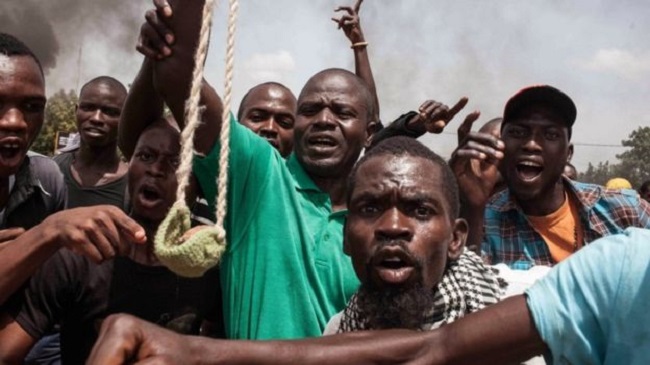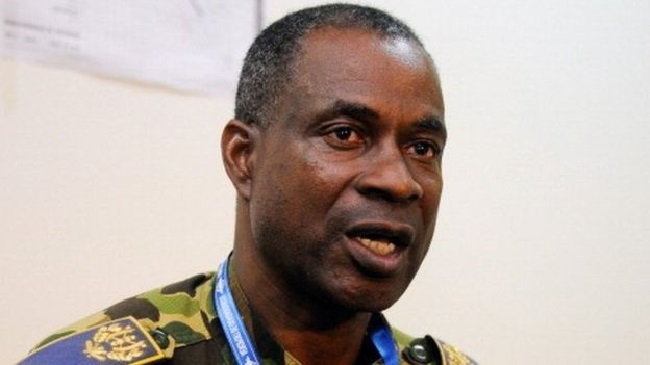B. Faso: The return of the phantoms of the past
In the afternoon on Wednesday 16 September 2015, soldiers of the infamous Regiment of the president’s security forces – Regiment de Sécurité Présidentielle (RSP) – entered the Presidential Palace Kosyam where the Government Council meeting was ongoing, and took the government in custody. This is the fourth time during the less than one-year-transition that the RSP threatens and assaults the Transition regime. This time, just a few weeks prior to the presidential and general elections scheduled on 11 October 2015, the RSP’s intervention is an outright attack on the painstaking paths towards a veritable democracy in Burkina Faso.
The President’s Security Forces RSP is a 1,200 men strong elite unit that was founded by ex-President Compaoré in 1996. Its origin is also to be found in the Commando Troops that killed late President Thomas Sankara in a bloody coup in October 1987.
On 16 September militaries of RSP arrested President Michel Kafando, Prime Minister Isaac Yacouba Zida and other members of the Government. Since then Kafando and Zida are, together with some other members of the Transition government, held in custody in the Presidential Palace – or possibly in the President’s residence next door. During the night of 16 and 17 September, negotiations have been ongoing until 3 o’clock in the morning without any results. Meanwhile four female members of the Government would have been released.
There has been gunfire and security forces chased protesters in the capital’s different neighborhoods, especially those in the proximity of the presidential palace Kosyam. In the morning on 17 September, streets in Ouagadougou’s neighborhoods were reported to be empty with RSP-vehicles circulating to dissolve any gathering.
The demand of the coup-makers, according to some reports led by a certain Aziz Korogho who recently returned to the country after internship abroad, was initially that President Kafando and Prime Minister Zida sign their resignations, something that they have refused. Yet behind the security forces’ action, one may perceive the contours of Congrès pour la Démocratie et le Progrès (CDP) – ex-president Blaise Compaorés party. One of its leaders, Vice-president Léonce Koné, declared not condemning the coup, a statement that speaks for itself.
On Thursday morning 17 September, a declaration the National Council for Democracy – Conseil national pour la démocratie (CND) – read at National Television announced its take-over of power in Burkina Faso. Accordingly, the declaration states that the never heard of CND (read: the coup-makers) has dismissed the Transition President Kafando of his functions, and that the government as well as the National Council for the Transition have been dissolved. The coup-makers hold the deviation of the transition regime, the exclusion of candidates in the upcoming elections, as well as the status of the National Armed Forces, as reasons that would justify their violent take-over.
At the time, people are urged by civil society organizations, political parties and committed citizens to mobilize and gather at the Revolution Square in central Ouagadougou. Transition President Chériff Sy has called for resistance against the coup. Reportedly, he is currently under the protection of the National gendarmerie. Similarly, trade unions have called for a general strike of the entire national territory as long as the crisis remains. The international community (ECOWAS, the AU, the EU the UN, the USA) condemn in strong terms what is happening in Burkina Faso.
The civil society leader Smockey Bambara of Balai citoyen (Citizen Broom that played a critical role in the 2014 Revolution) declares that there are no more chances of changing this country and that what we currently see is “the return of the phantoms of the past”. These phantoms “will watch out for us if we do not make united and unanimous front the coming days”. Smockey calls all patriotic forces to side with legality and the Burkinabe people. The presidential candidate Tahirou Barry published a statement on Facebook where he denounces that “the monster created by Blaise Compaoré wants to install chaos in Burkina Faso”.
In a Facebook reaction to the declaration of the coup-makers, Citizen Broom calls to resistance against “these rascals and evil-makers” that think that the Burkinabe people would accept their coup attempt, a thought that is already “a bad joke in the eyes of the national community”. It calls on the National Army to take its “historical responsibilities” against this armed aggression on the Burkinabe people and its institutions.
It is still difficult to predict how this will end, given the ways in which things evolve rapidly. Let me nevertheless conclude by asking three questions, the answers of which seem central for the coming days of Burkina Faso:
- Is it a genuine attempt to take power in order to change the team ahead and postpone the presidential elections? Nowadays, coup-leaders tend to finish badly, despite the chaos and misery that they may provoke in the meantime. Still, evidence suggests that the so-called CND, created as it is out of nowhere, is mistakenly acting independently of the epoch internationally. Coups d’état are not going to be lasting any longer: “ils se trompent de l’époque”, as a Burkinabe just said to me on phone.
- Is it an attempt by security forces to get guarantees for RSP’s continued existence and special status in Burkina Faso? These “phantoms of the past” are indeed the military unit behind most political violence and assassination in last decades, including the assassination of journalist Norbert Zongo, and other citizens pressing claims for political and civil liberties. They would thereby seek to preserve corporatist interests, fearing what an elected president may decide on their future.
- Or, is it simply the last opportunity for the core of the old-power holders led in the shadows by General Gilbert Diendéré to maintain power and control? Since January 1966, the military is in power in Burkina Faso, even though they have for long time been disguised in civilian clothing.
One thing is sure: what happens these days in Burkina Faso will have implications for democracy in Africa as a whole.
Sten Hagberg, the writer of this article, is Professor of Cultural Anthropology and Chair of the Forum for Africa Studies at Uppsala University. He has done research in Burkina Faso since 1988, and is currently conducting research on municipal politics in Burkina Faso and Mali.



